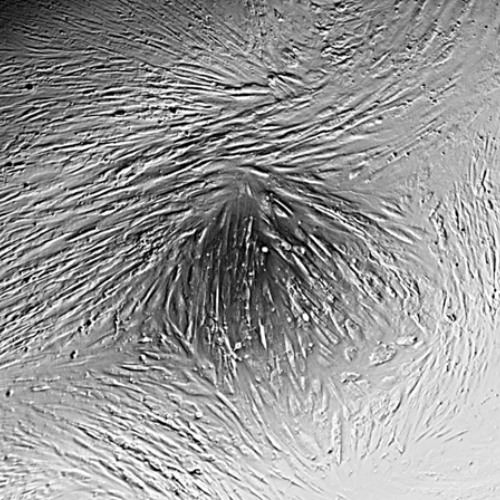Mesenchymal Stem Cell Therapy: A Path to Recovery
If conventional medicine has failed you, alternative medicine could help. At Immunotherapy Regenerative Medicine, we offer cutting-edge treatments with mesenchymal stem cells (MSCs) to promote healing and improve quality of life.
Start Living a More Comfortable Life
Isn’t it time to take control of your health? At Immunotherapy Regenerative Medicine, we are a leading center certified in stem cell treatments, and we have our own laboratory to ensure the highest quality and safety in every therapy.
Using high-quality mesenchymal stem cells (MSCs), we help promote cell growth, regeneration, and improve immune system function. Our goal is to enhance your quality of life with clinically proven stem cell therapy for autoimmune diseases, chronic degenerative diseases, aging, and more.
Mesenchymal stem cells have the ability to differentiate into various types of cells in the human body and help produce the healthy cells you need. This can reverse many health problems and help prevent conditions from developing or worsening.
If you have been told that your condition is untreatable, we encourage you to seek a second opinion from our stem cell specialists.
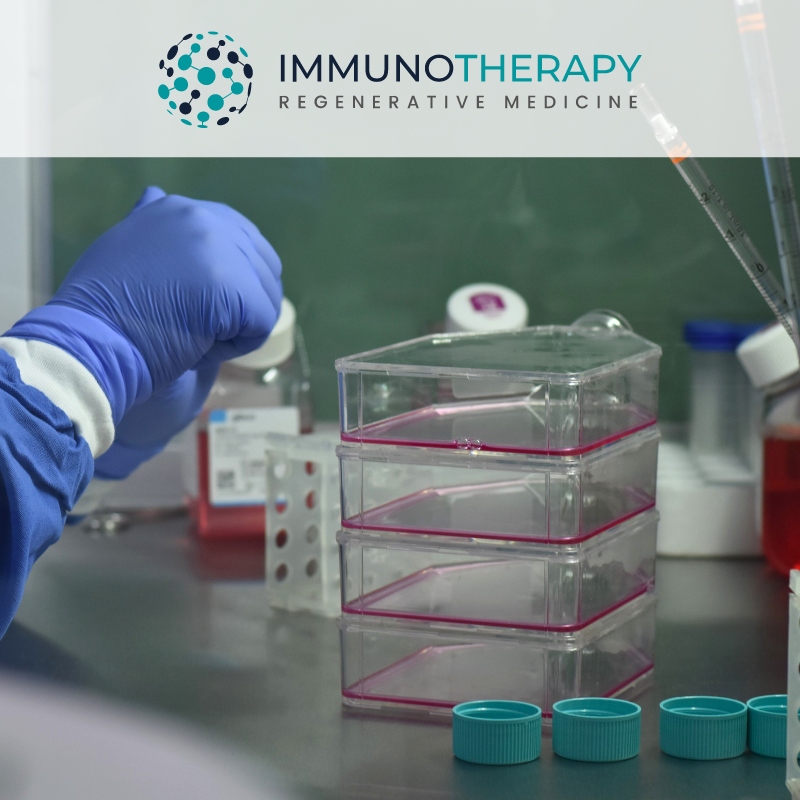
Why Choose Stem Cells Therapy?
It is a less invasive and more natural regenerative option
CONVENIENT
Mesenchymal stem cells (MSCs) are highly compatible. They have the ability to develop into many types of cells to help regenerate tissues and regulate the immune system, offering a personalized and adaptable solution for each patient.
SAFE
This alternative medicine has been scientifically studied and proven to be a safe and effective treatment option for many types of disorders. Research and clinical experience support the safety of MSC treatments.
PAINLESS
Each mesenchymal stem cell treatment is personalized according to your needs and goals, using minimally invasive procedures to achieve maximum results without causing significant discomfort.
NATURAL
Patients of all ages, especially older adults, benefit from MSCs to promote natural regeneration and healthy cell growth, rather than resorting to invasive surgery.
How Can Stem Cell Therapy Help You?
Mesenchymal Stem Cells (MSCs) have been studied and used to treat a wide range of medical conditions. In the field of regenerative medicine and tissue repair, MSCs have shown significant potential in the treatment of autoimmune, cardiovascular, neurological, orthopedic, and respiratory diseases. Additionally, MSCs can play a crucial role in managing aging by promoting cell regeneration and improving quality of life.
The ability of MSCs to differentiate into various types of cells makes them ideal for repairing damaged tissues and modulating the immune system. They have shown efficacy in reversing the effects of neurodegenerative diseases such as Alzheimer’s and Parkinson’s, as well as in repairing spinal cord injuries and brain damage caused by strokes. MSCs are also useful in treating cardiovascular diseases by helping regenerate damaged tissues and blood vessels, and in orthopedic conditions by promoting the recovery of joint and muscle injuries.
Additional Ways Mesenchymal Stem Cell (MSC) Healing Can Help
Mesenchymal stem cell (MSC) therapy offers numerous benefits beyond tissue repair and immune system modulation. It accelerates recovery time after an injury or surgery, promoting faster and more efficient healing. Additionally, it helps prevent scar tissue formation, resulting in a cleaner and less painful recovery.
Another significant benefit is pain reduction, especially in cases of chronic diseases. MSCs are also effective in regenerating brain cells and repairing nerve damage, which is crucial for improving neurological functions. In chronic degenerative diseases and autoimmune disorders, MSC therapy can reverse the effects of these conditions by 80-100%.
Moreover, MSCs enhance movement and flexibility, contributing to a better quality of life. They increase collagen production, which is beneficial for aesthetic and anti-aging purposes, and help minimize or restore hair loss. These benefits combine to offer a comprehensive and effective solution for various health needs.
Personalized Treatments at Immunotherapy Regenerative Medicine
Mesenchymal stem cell (MSC) therapy is an innovative and effective way to treat numerous conditions and diseases. We understand that it is a significant investment and that other alternatives may exist, so we strive to ensure the success of your stem cell treatment and never recommend anything unless we are confident it will help you.
At Immunotherapy Regenerative Medicine, we not only administer stem cells but also offer comprehensive and personalized protocols for each patient. We take the time to get to know you and your body, adequately preparing you for therapy and recommending ways to enhance healing and health. Each treatment is meticulously supervised and planned, always ensuring the highest quality and compatibility.
Our stem cell specialist, Dr. Romero, has over 20 years of experience in alternative medicine and has been involved in early stem cell research. Following his method, our team works closely with you to provide supportive treatments that maximize the effects of regeneration and healthy cell growth, achieving the best results in every therapy.
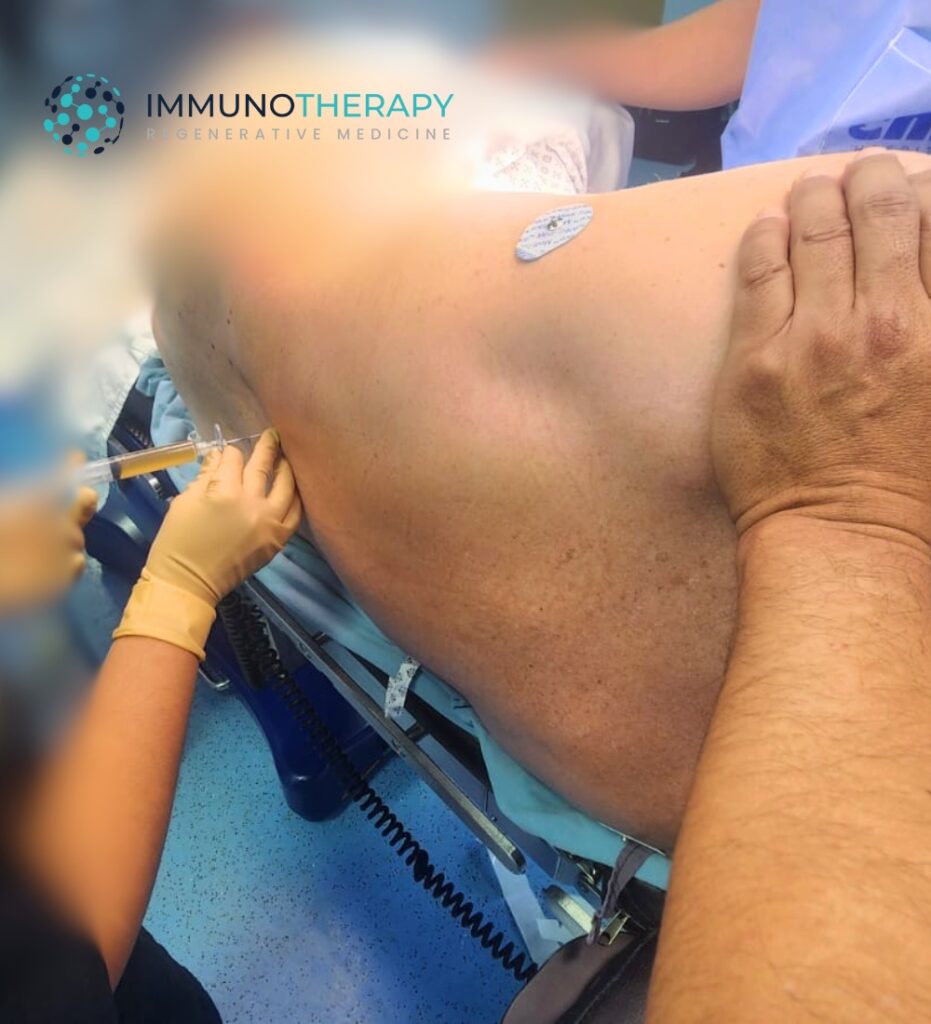
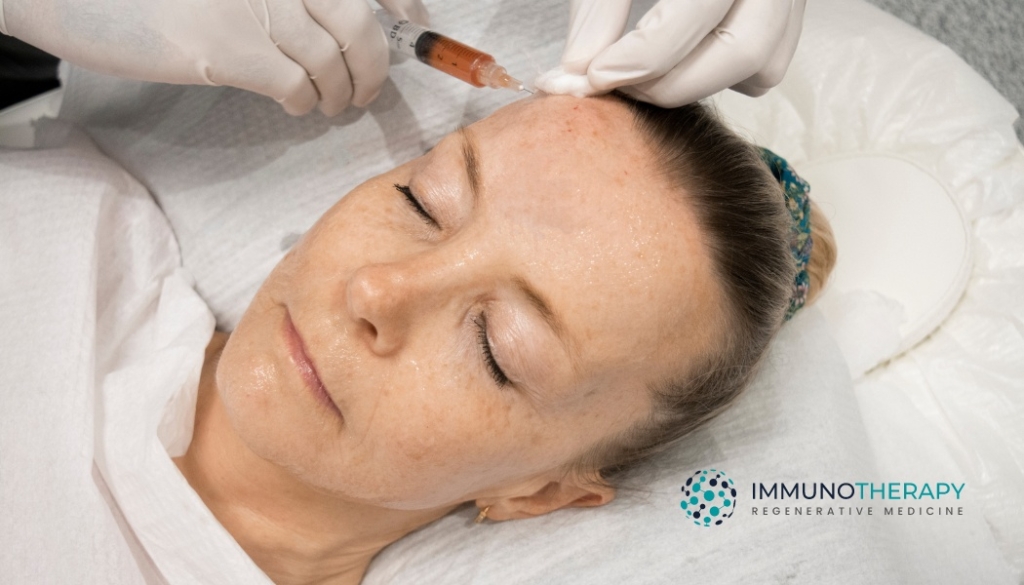
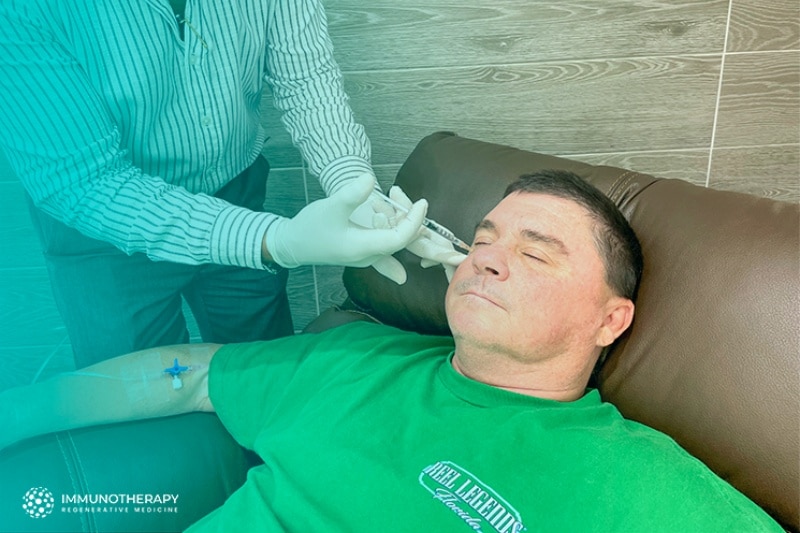


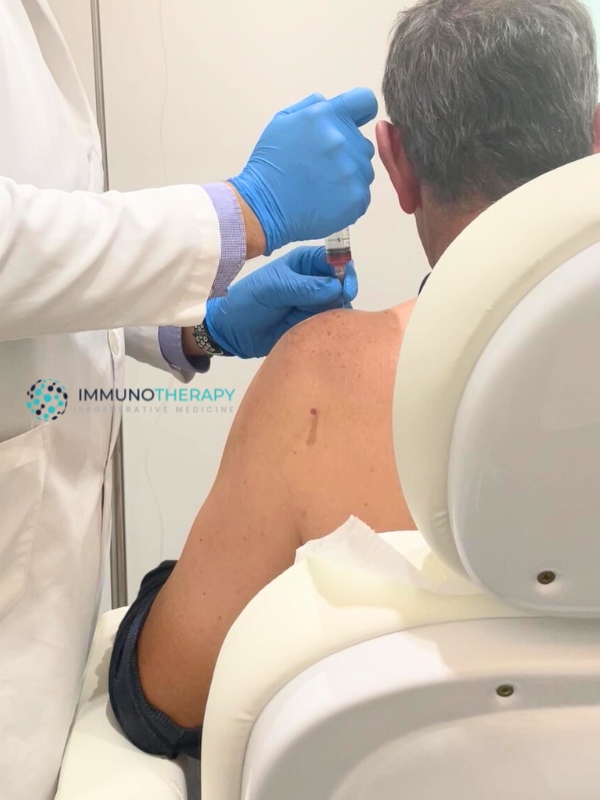
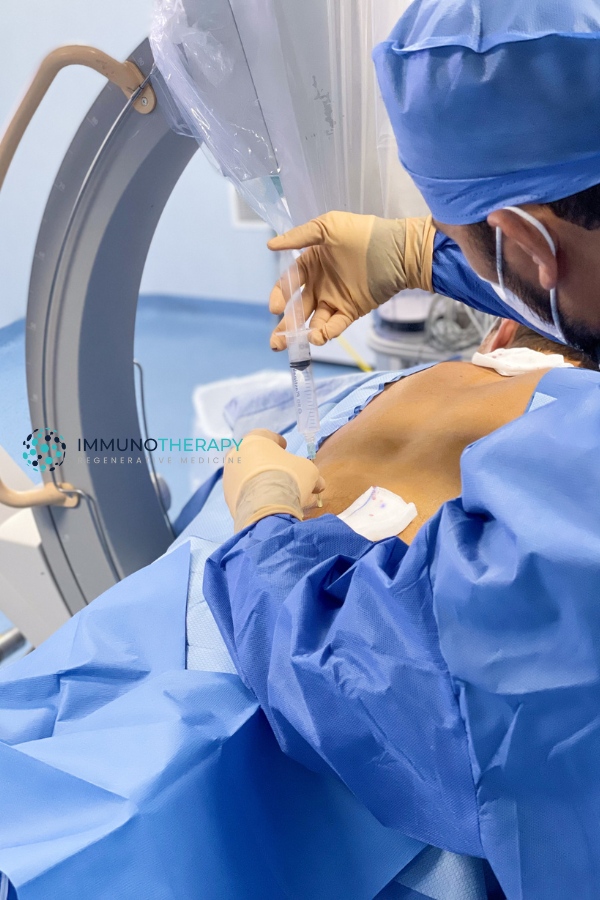
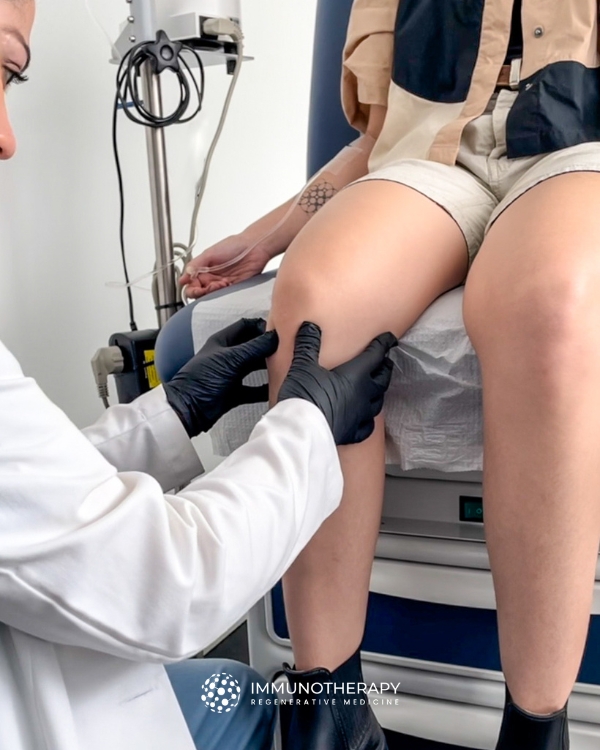
Frequently Asked Questions about Mesenchymal Stem Cells
What are Mesenchymal Stem Cells?
Mesenchymal stem cells (MSCs) are cells with a fibroblast-like or spindle-shaped morphology, possessing multipotential characteristics and the ability for asymmetric self-renewal. These cells, approximately 5-20 microns in size, must express surface proteins such as CD73, CD90, and CD105, and should not express any hematopoietic proteins like CD34 or leukocytic proteins like CD45 and CD14.
What types of mesenchymal stem cells are used in therapy?
At Immunotherapy Regenerative Medicine, we utilize a variety of mesenchymal stem cells sourced from different tissues to ensure effective and personalized treatments. These include stem cells derived from dental pulp, adipose tissue, apical papilla, placenta, Wharton’s jelly, endometrial tissue, umbilical cord, and bone marrow.
We take pride in the fact that our stem cells are ethically sourced and processed in our own COFEPRIS-certified laboratory (equivalent to the FDA), ensuring the highest standards of quality and safety for our patients.
This comprehensive approach allows us to offer advanced and effective therapies tailored to the specific needs of each patient, optimizing the outcomes of regenerative medicine treatments.
What are Wharton's jelly-derived stem cells?
Wharton’s jelly is a gelatinous substance found in the umbilical cord, where the mother’s and baby’s tissues are separated. It’s abundant with mesenchymal stem cells. These cells are also known as universal donor cells because they interact with any type of tissue.
Other stem cells contain SVF (stromal vascular fraction) and are harvested from fat, bone marrow, and other tissues. Those types of stem cells are grouped with different cell types and require extracting. On the other hand, Wharton’s jelly-derived stem cells are already isolated and can be obtained in large quantities.
To harvest Wharton’s jelly stem cells, specialists use pre-screened donors who donate their umbilical cord after a full-term pregnancy. The procedure for getting these stem cells is safe, non-invasive, and painless.
What makes Mesenchymal Stem Cells useful in a clinical setting?
Mesenchymal stem cells are clinically useful due to their multipotential capacity. In the presence of an appropriate microenvironment rich in specific growth factors, these cells can differentiate into specialized cells of various tissues, including bone, tendons, heart, liver, lung, brain, muscle, and blood vessels.
Are Mesenchymal Stem Cells safe?
Yes, research conducted between 2000 and 2010 has demonstrated that human mesenchymal stem cell transplants are non-tumorigenic, meaning they do not generate tumors or cancer. Since the inception of human transplants, there have never been any reports worldwide of these cells causing tumors or cancer.
Is there a possibility that my body will reject Mesenchymal Stem Cells?
No, mesenchymal stem cells are minimally immunogenic, meaning the risk of rejection is very low or nonexistent. This is because they secrete numerous proteins that modulate the recipient’s immune responses through various cellular mechanisms, making them tolerogenic.
Do Mesenchymal Stem Cells get trapped in the lungs? (Pulmonary first-pass effect)
Although transplanted cells administered systemically pass through the lungs first, it has been shown that many cells travel to other organs such as the liver, kidneys, heart, etc. In conditions where tissue damage is present, different factors are released that attract mesenchymal stem cells more strongly towards the damaged tissues. Through a process known as chemotaxis, mesenchymal stem cells migrate towards areas with a higher concentration gradient, involving the interaction between specific receptors or ligands, usually associated with damaged tissues.
How can I determine if Mesenchymal Stem Cells can help me?
Mesenchymal stem cells can be beneficial in a wide range of conditions. However, to maximize the benefits, it is crucial to personalize treatment protocols and consult with specialized medical personnel.
Can Mesenchymal Stem Cells help prevent aging?
Yes, mesenchymal stem cells can delay aging by secreting proteins that are no longer produced in sufficient quantities by the body’s aging cells, and they help maintain cell numbers in balance. Additionally, they can transfer new mitochondria that improve biological processes, thereby enhancing the aesthetic appearance of patients. This strengthens and revitalizes cells, contributing to greater longevity and health.
Are there ethical issues related to this form of Mesenchymal Stem Cell therapy?
No, mesenchymal stem cell therapy does not pose significant ethical issues, as it uses adult cells obtained from non-controversial tissues and does not involve the destruction of human embryos. Generally, waste tissues such as the umbilical cord, placenta, baby teeth, liposuction fat, menstrual blood, etc., are used.
Do you provide educational material?
We can readily provide internationally published scientific material in prestigious peer-reviewed journals related to any specific documented condition.
Can Mesenchymal Stem Cells cause graft-versus-host disease?
No. Graft-versus-host disease is caused by immune system cells called lymphocytes. In hematopoietic progenitor cell transplants, these are purified, but they usually carry about 0.01% lymphocytes, which are activated in the recipient’s secondary organs and recognize the recipient as foreign, attacking it. Research conducted since 2009 has shown that mesenchymal stem cells significantly reduce the incidence of graft-versus-host disease. This is because mesenchymal stem cells secrete tolerogenic factors that prevent the activation of lymphocytes responsible for graft-versus-host disease.
Where do Mesenchymal Stem Cells come from?
Mesenchymal stem cells are obtained from healthy tissues such as the umbilical cord, placenta, dental pulp, apical papilla, and endometrial tissue. Primary cultures of these cells are meticulously analyzed to detect the presence of viruses such as cytomegalovirus (CMV), human immunodeficiency virus (HIV), hepatitis A, B, and C, and mycoplasma, ensuring their safety for clinical use.
Importance of Bone Marrow Stem Cells
Bone marrow is a primary lymphoid tissue where all blood cells are generated from a CD34+ hematopoietic stem cell, and it also houses bone marrow-derived mesenchymal stem cells, where their existence was first discovered. Both types of cells are used in different pathologies; for example, hematopoietic stem cells are transplanted in cases of leukemia, while mesenchymal stem cells are employed in regenerative medicine and can be co-transplanted to treat graft-versus-host disease.
Types of Stem Cell Transplants
There are three types of stem cell transplants: autologous, allogeneic, and xenogeneic. Currently, xenogeneic transplants are not performed in our country. The most performed type of transplant worldwide is the allogeneic stem cell transplant, with excellent results when high-quality cells are used and following good manufacturing practices.
What are the risks of Mesenchymal Stem Cell therapy?
Mesenchymal stem cell therapy is safe and does not present short- or long-term risks. Some patients may experience minor side effects such as headaches, breathing difficulties, or inflammation at the application site, but these symptoms generally resolve within 24 hours.
How do adult stem cells compare to embryonic stem cells?
Embryonic stem cells, obtained during the early stages of fertilization, are pluripotent and capable of giving rise to a complete individual. Their clinical use is not permitted due to their high potential to generate tumors or cancer. On the other hand, adult stem cells, while only multipotent and limited to differentiating into certain cell types of specific organs, are less controversial and their use is permitted clinically in many pathologies or aesthetics.
How long does it take to see the effects of Mesenchymal Stem Cell therapy?
The effects of mesenchymal stem cell therapy can begin to be observed between three days and one week after the transplant, reaching their maximum benefit between four and eight weeks. Due to their potent anti-inflammatory action, results may be noticeable from the first week.
Is Mesenchymal Stem Cell therapy approved by health authorities?
Yes, in Mexico, COFEPRIS (equivalent to the FDA) is the entity responsible for approving cellular therapies, including mesenchymal stem cell therapies.
How are Mesenchymal Stem Cells stored and processed before use?
In our clinic, mesenchymal stem cells are harvested one hour before their application, ensuring their viability and function. They are transported in a cold chain at approximately 4-5°C and harvested using a safe and reliable enzymatic method.
What diseases and conditions can be treated with Mesenchymal Stem Cell therapy?
Mesenchymal stem cell therapy has proven effective in treating a wide range of diseases, including rheumatoid arthritis, systemic lupus erythematosus, multiple sclerosis, type I diabetes mellitus, and many other conditions such as fractures, acute myocardial infarction, graft-versus-host disease, asthma, allergies, for aesthetic purposes, tendon or joint injuries, thanks to their versatility and regenerative capacity.
What should I expect during the recovery process from mesenchymal stem cell therapy?
During recovery, it is essential to follow the recommended dietary and exercise care according to the patient’s age and disease to maximize and prolong the beneficial effects of cell therapy.
Can mesenchymal stem cell therapy be combined with other treatments?
Yes, stem cell therapy can be combined with other treatments, although it is advisable to avoid those that are cytotoxic and may affect the viability of stem cells. Always consult your doctor for more information.
How is the quality and purity of mesenchymal stem cells used for treatment ensured?
Our clinic guarantees the quality and purity of mesenchymal stem cells by harvesting them the same day of their application. A cell viability sheet is provided confirming a viability percentage above 95%, and flow cytometry is performed to verify membrane markers, ensuring they meet international standards for mesenchymal stem cells.
How does our stem cell therapy work?
Immunotherapy Regenerative Medicine will always strive to offer the best possible result – our methods are meant to not hope for results but make all possible for them to occur.
As part of them, our doctors use exosomes to improve the chances of success for stem cell therapy, which helps the body turn undifferentiated cells into the cell type your body requires and accepts.
Exosomes are messengers, small particles outside the cell that send and deliver messages between cells. As a result, they enhance cell-to-cell communication so that your cells work well together.
Is stem cell therapy right for you?
Each person is unique, and so are their needs. Thus, while stem cell therapy is a promising alternative treatment for many diseases and health conditions, there is no magic cure available for every illness.
Our stem cell therapy always goes with other natural therapies and lifestyle recommendations, personalizing the treatment and making the most of it for you.
Do not hesitate to contact our clinic to determine if stem cell therapy is right for you.
